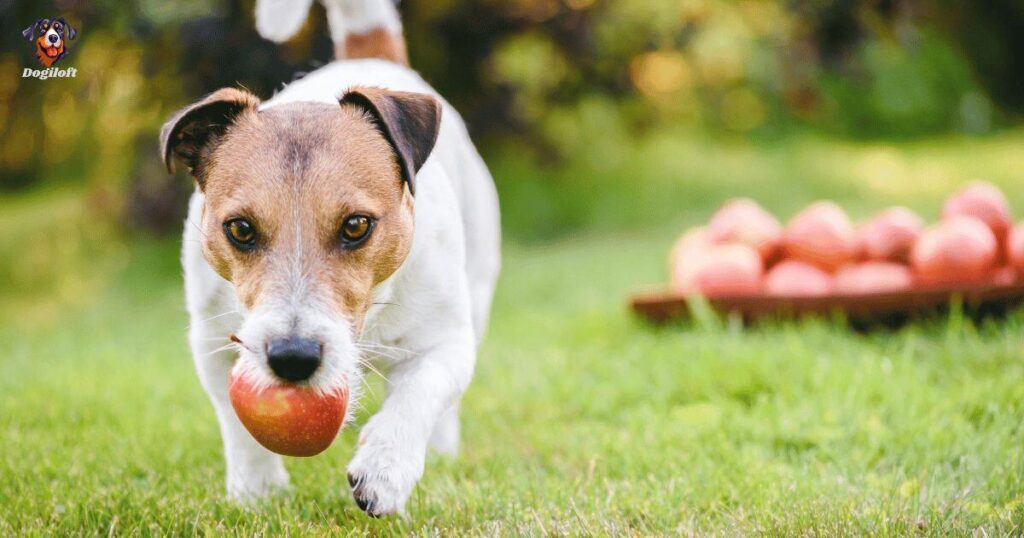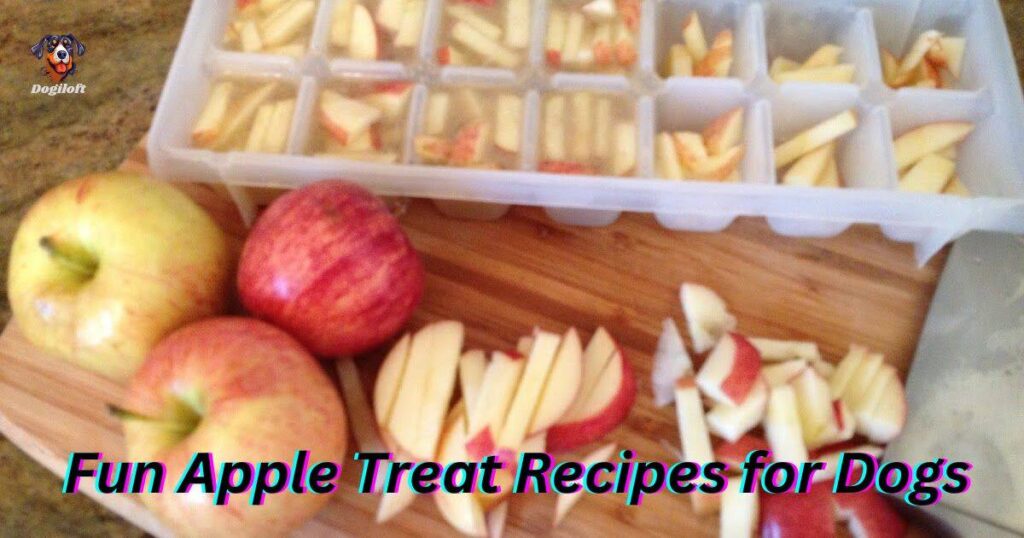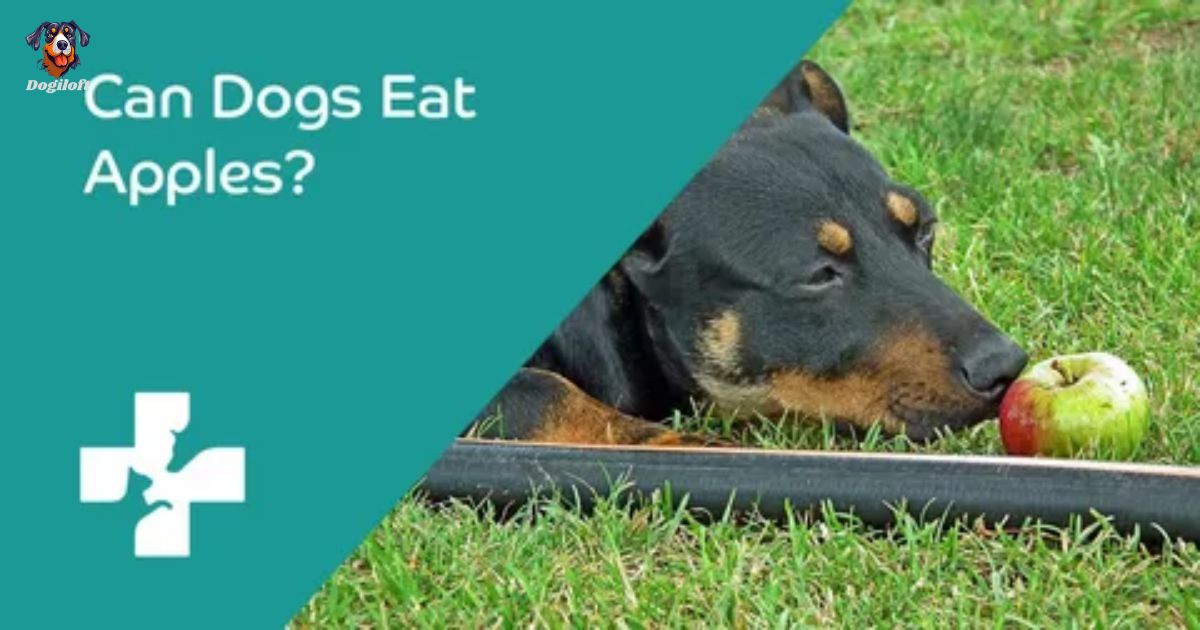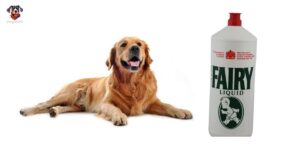For humans, an apple a day keeps the doctor away. But what about for dogs? Fortunately, dogs can enjoy these sweet, crispy treats in moderation—and most of them love it!
For humans, apples add fiber, are low in calories, rich in antioxidants, and provide vitamins A, C, K, and potassium. So, you may be wondering: Are apples good for dogs? The answer is yes!
Many dog foods even include apples as an ingredient. However, it’s important to know how to prepare apples and the right serving size to safely share them with your dog.
Are Apples Good for Dogs?
Yes, apples can be a healthy treat for dogs. They are rich in vitamin C, vitamin A, potassium, and antioxidants. Apples are also packed with fiber, especially in the peels, which helps with digestion and weight management. Although apples are low in calories, they contain about 19 grams of sugar each. Therefore, giving your dog a whole apple may be excessive. Instead, apples can satisfy your dog’s sweet tooth safely, unlike harmful foods like chocolate.
Apples provide several health benefits for dogs. The vitamin C content supports immune health and helps fight free radicals. While dogs don’t require vitamin C, it can still contribute to their overall well-being. Apples also offer carbohydrates, which give your dog energy for playtime, and the fiber helps regulate digestion, weight, and blood sugar levels.
In last, apples are a nutritious treat for dogs. They are rich in various vitamins and minerals, including vitamin K, zinc, and iron. These nutrients help strengthen the immune system, improve digestion, and promote overall health.
Do Dogs Like Apples?
Not all dogs like apples, as it depends on their individual taste preferences. Some dogs enjoy the sweet and crunchy texture, while others may not be interested. It’s always good to offer a small piece and see how to help a coughing dogfoo if your dog likes it.
Are Apples Safe For Dogs?

Apples can be safe for dogs as occasional snacks, but moderation is important to prevent potential digestive upset. Since apples contain fiber, feeding too many may cause stomach discomfort, as dogs have slower digestion than humans.Not all parts of the apple are safe. The core and seeds contain cyanide, a toxin that can be harmful if ingested in large amounts. Always remove the core and seeds to avoid this risk.
Large apple pieces can also be a choking hazard. Cutting apples into small, manageable pieces will make them easier and safer to eat. Peeling the apple may also be wise, as the peel can stick between teeth or add extra fiber, which some dogs don’t tolerate well.If your dog has an underlying condition, like diabetes, speak to your vet before introducing apples. This will help ensure they’re a safe and beneficial treat.
How Many Apples Can Dogs Eat?
Your canine companion may enjoy crunching on apples, but it’s important to feed them in moderation. Overindulging in apples can lead to digestive issues like bellyaches or diarrhea. A slice or two is sufficient to satisfy your dog’s craving for this tasty fruit.
Puppies and Apples:
Puppies can also enjoy apples, but if it’s their first time, start with a small piece, such as a slice or cube. Always monitor them closely for any signs of an allergic reaction or digestive problems. If you notice any adverse effects, discontinue feeding them apples and consult your veterinarian.
Sugar Content and Daily Intake
While we’ve addressed the question, Can dogs have apples? it’s essential to remember that treats, including apples, should constitute no more than 10% of your dog’s daily caloric intake. Keep in mind that apples contain more sugar than many of the foods your dog typically consumes.
Important notice: Excessive sugar can lead to short-term digestive upset and contribute to long-term health issues like diabetes and obesity, so always keep portion sizes small.
How to Safely Prepare Apples for Dogs?
1. Wash Thoroughly
Begin by washing and scrubbing your apples to eliminate bacteria and germs. Many supermarket apples are treated with pesticides, making a thorough rinse essential for your dog’s safety.
2. Remove Seeds and Stem
Keep the seeds and stem away from your dog. Apple seeds contain a small amount of cyanide, which can be toxic in large doses. The tough core and stem can also pose a choking hazard. If your dog accidentally consumes them, monitor for any signs of digestive trouble or blockage.
3. Cut into Manageable Pieces
Cut apples into slices or small cubes to make them easy for your dog to eat. The size of the pieces should depend on your dog’s breed—small breeds, like Chihuahuas, require smaller pieces, while larger breeds, like Labradors, can handle bigger slices. However, it’s always safer to err on the side of cutting them too small.
4. Optional Peeling
While not necessary, peeling the apple can make it easier for your dog to digest and reduce fiber intake.
Fun Apple Treat Recipes for Dogs

Roasted Apple Chips
A simple way to prepare roasted apple chips is by baking thinly sliced (and cored) apple slices at 200°F for about two hours until completely crispy. What are safe fruits for dogs to eat?
Apple Pretzels or Cookies
You can also make delicious dog-friendly treats. Here’s a quick recipe for apple peanut butter cookies:
Ingredients
- 4 cups of ground oat flour
- ⅔ cup of unsweetened applesauce
- ½ cup of peanut butter
- 2 eggs
Instructions
1. Combine all ingredients.
2. Cut out cookie shapes.
3. Bake at **350°F** for **20 to 25 minutes**.
Important Note: Avoid feeding your dog apple pie or anything containing nutmeg, as these can be harmful to dogs. Always consult with your vet if you’re unsure about what foods are safe for your furry friend!
Can Dogs Eat Applesauce?
Plain, unsweetened applesauce is generally safe for dogs to eat in moderation. However, applesauce often contains added sugars, so it’s important to choose an unsweetened variety. Frozen applesauce cubes can make a great cooling treat for dogs on hot days or after exercise.
Can I Feed My Dog Apples?
Yes, you can feed your dog apples in moderation. Apples are generally safe for dogs to eat and can even be a healthy treat. However, there are a few things to keep in mind:
The Benefits of Apples for Dogs
- Apples are a good source of fiber, which can help with your dog’s digestion.
- They contain vitamins A and C, as well as antioxidants that can boost your dog’s immune system.
- The crunchy texture of apples can help clean your dog’s teeth and freshen their breath.
How to Feed Apples to Your Dog
- Only give your dog small, bite-sized pieces of apple. Don’t let them eat the core or seeds, as these can be choking hazards.
- Remove the seeds and stem, as they contain trace amounts of cyanide that can be toxic to dogs in large quantities.
- Start with just a small slice or two to see how your dog reacts. Some dogs may have trouble digesting apples.
- Apples should make up no more than 10% of your dog’s overall diet. They should be used as an occasional treat, not a regular meal.
Risks of Feeding Apples to Dogs
- The high fiber content in apples can cause digestive issues like diarrhea or gas if your dog eats too many.
- The sugar in apples can also lead to weight gain if your dog eats too many.
- Some dogs may be allergic to apples, so watch for signs of an upset stomach or other reactions.
As long as you feed apples in moderation and take the proper precautions, they can be a tasty and healthy snack for your canine companion. Always consult your veterinarian if you have any concerns about what foods are safe for your dog.
FAQ’s about ca dogs eat apples
Can dogs eat apples in the morning?
Yes, dogs can eat apples in the morning, but only in small amounts. Just one or two small slices are enough. Make sure to remove the core and seeds, as they’re not safe for dogs. Apples can be a healthy, light snack for them to start the day!
can dogs drink apple juice?
Dogs can drink a small amount of pure, unsweetened apple juice as an occasional treat. However, it’s best to avoid juices with added sugars or preservatives. Fresh apple slices are a healthier option!
can dogs eat apple cider vinegar?
Yes, dogs can have apple cider vinegar in small amounts, usually diluted with water. It may aid digestion, but always consult your vet before adding it to their diet.
Conclusion
In conclusion, apples can be a delightful and healthy treat for dogs. With their rich nutrients and satisfying crunch, they provide various benefits for our furry friends. However, it’s essential to remember the safety tips. Removing seeds and cores and offering only small pieces ensures a safe snacking experience for your pet.
Every dog has its unique taste preferences. Some might love apples, while others may not show much interest. Exploring your dog’s reaction to apples can be an enjoyable experience. Sharing moments like this adds joy to pet ownership and deepens your bond.








